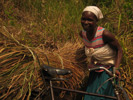
The innovative Institute for Inclusive Security, which includes the equally impressive Women Waging Peace Network, hosted its tenth annual Policy Forum today in Washington. The forum marked the end of a colloquium that brought together 21 women leaders from 12 conflict and post-conflict areas around the world, from Kashmir to Southern Sudan to Northern Uganda. These champions of women’s rights are coordinating their efforts around the powerful idea of “inclusive security”: the notion that women should and must be included as stakeholders—not “afterthoughts,” in the words of one Forum panelist—in efforts to avert violence and resolve conflict. Too often, in conflict zones around the world where women are routinely targeted in brutal acts of sexual violence committed by militias and national armies alike, women are excluded from political processes and denied the chance to play a vital role in peacemaking efforts.
Lina Zedriga Waru Abuku, a Ugandan magistrate turned war widow who now works to empower women in peace and reconciliation efforts in Northern Uganda, explained inclusive security clearly: “Nothing about us [women] without us.” Rangina Hamidi, an Afghan woman who founded the first women’s private enterprise in the conflict-ridden province of Kandahar, argued that women living in conflict zones are not and do not wish to be seen as “victims.” Instead, they want to be included from the ground up in peace processes and post-conflict rebuilding efforts, and they want their resources as peacemakers to be utilized to better their societies.
This Forum highlighted the tenacity and perseverance of women around the world who are demanding to be heard and to play their rightful role in efforts to promote peace and equality in their societies. One speaker noted that of all the various peace agreements signed around the globe during the last five years, only about one percent of the signatories have been women.

